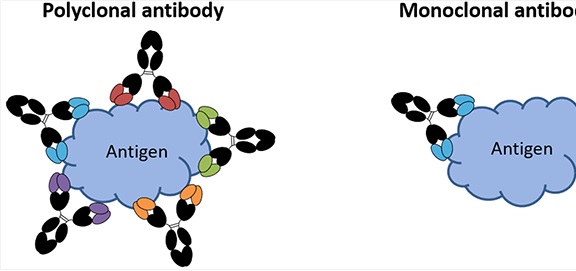
Antibodies are large Y-shaped proteins, or immunoglobulins, that are delivered by B cells as a resistance reaction in response to an unknown molecule. Polyclonal antibodies are typically produced by animal clone B-cell and contain a heterogenous combination of immunoglobulin G against an antigen. Polyclonal antibodies intended for use in research, medicine, or other commercial purposes are often created by infusing a lab animal with a particular antigen and then harvested from blood serum.
Recently, these antibodies were spotlighted in the news as a successful treatment for COVID-19 cases. Antibodies were selected from the blood of COVID-19 survivors and converted into a treatment method, specifically targeting the antigens in the viral infection in a human’s body. These treatments have been shown to be more protective than plasma. They reduce the viral load in a person, neutralizing targets and clearing out the virus so that the likelihood of severe damage and virus spread is reduced. Antibody therapies are also known for their uses in treating cattle and other domestic food animals. The combination of immunoglobulin in polyclonal antibodies makes it a front runner for treating rapidly evolving diseases.
A lesser-known and sometimes overlooked use for these antibodies is the treatment of plant diseases. Treatment of food crop diseases that lower quality, yield, and economical benefits is of particular importance. One example of polyclonal antibody use in crops was seen in the response to the Tomato Mosaic Virus (ToMV). ToMV causes severe quantity and quality loss in tomato production, but tomato plant protection is difficult to manage due to vector-less ToMV transmission. The virus is also resilient, and contaminated soil or plant debris can cause further infections. The most practical solution to ToMV infection is to use a rapid diagnostic assay to determine the viral presence in the plants before symptoms occur, then remove the virus-infected plants before they can pass on the virus. Antibodies must be developed for the immunochemical reaction in serological detection methods like ELISA.
A new polyclonal antibody, AB-1, has been shown to have a higher sensitivity to ToMV compared with other commercially available options. It has been used for ToMV detection in pepper and eggplant roots as well as ToMV detection in soil rhizosphere and root samples. AB-1 has also been used to detect two other tobamoviruses, PMMoV and TMV. The antigenic potential of the modified oligopeptides from the protein coat of ToMV SL-1 collected from immunized rabbits made this possible. The antibodies were created directly from the ToMV response, causing a higher success rate and more broad applicability. The AB-1 polyclonal antibody is suitable for agricultural use and can be applied to the screening of ToMV in tomato germplasm, breeding lines and parental genotypes, and tomato seeds during the certification process.
Polyclonal antibodies have made strong improvements in treating human viral infections, but therapies such as this offer promising solutions for multiple industries. Polyclonal antibodies can significantly improve fields beyond human medicine, and their uses should continue to be explored.


